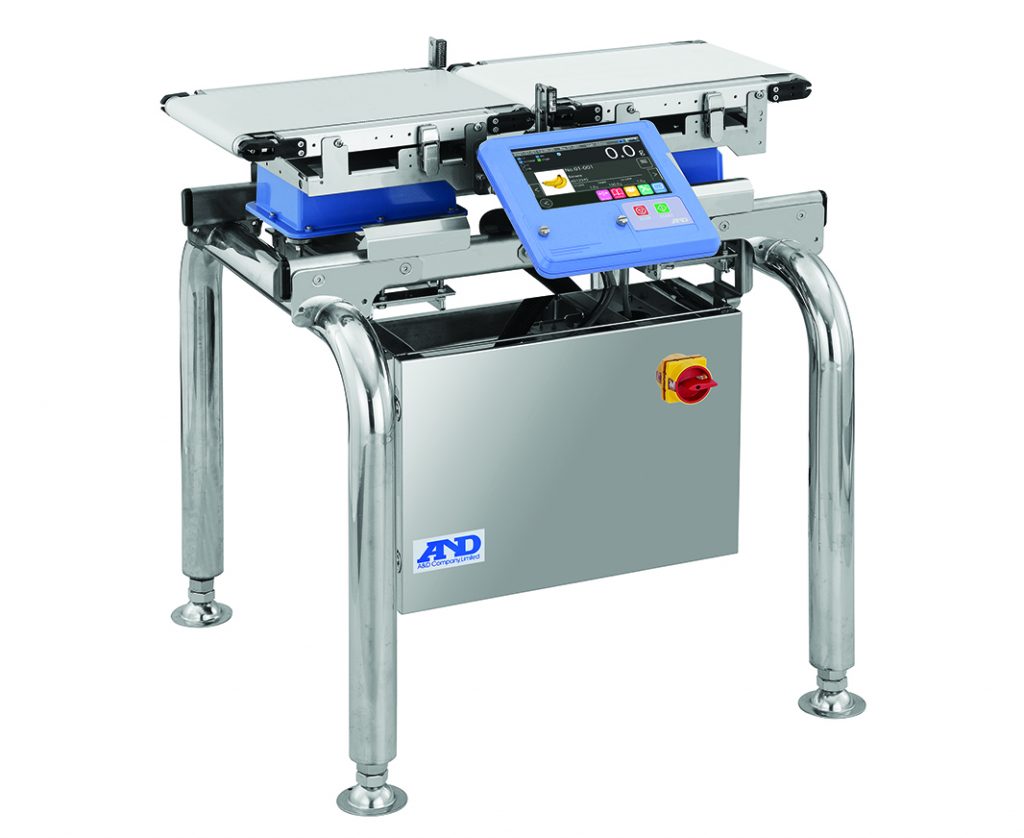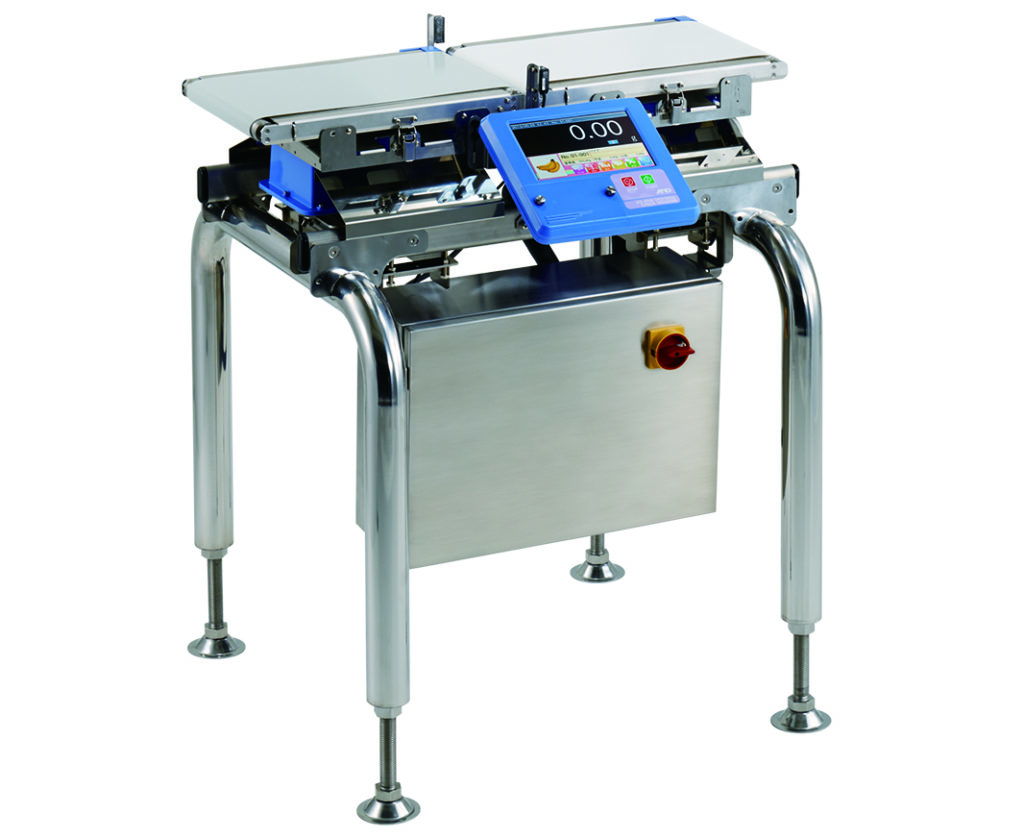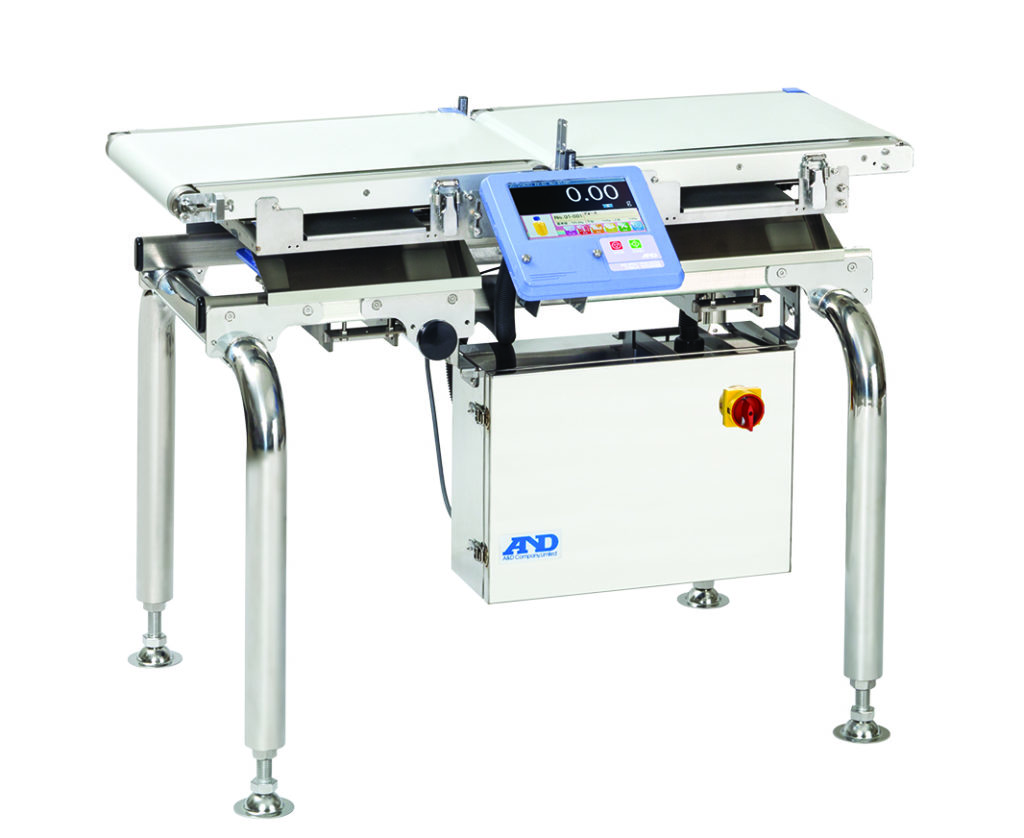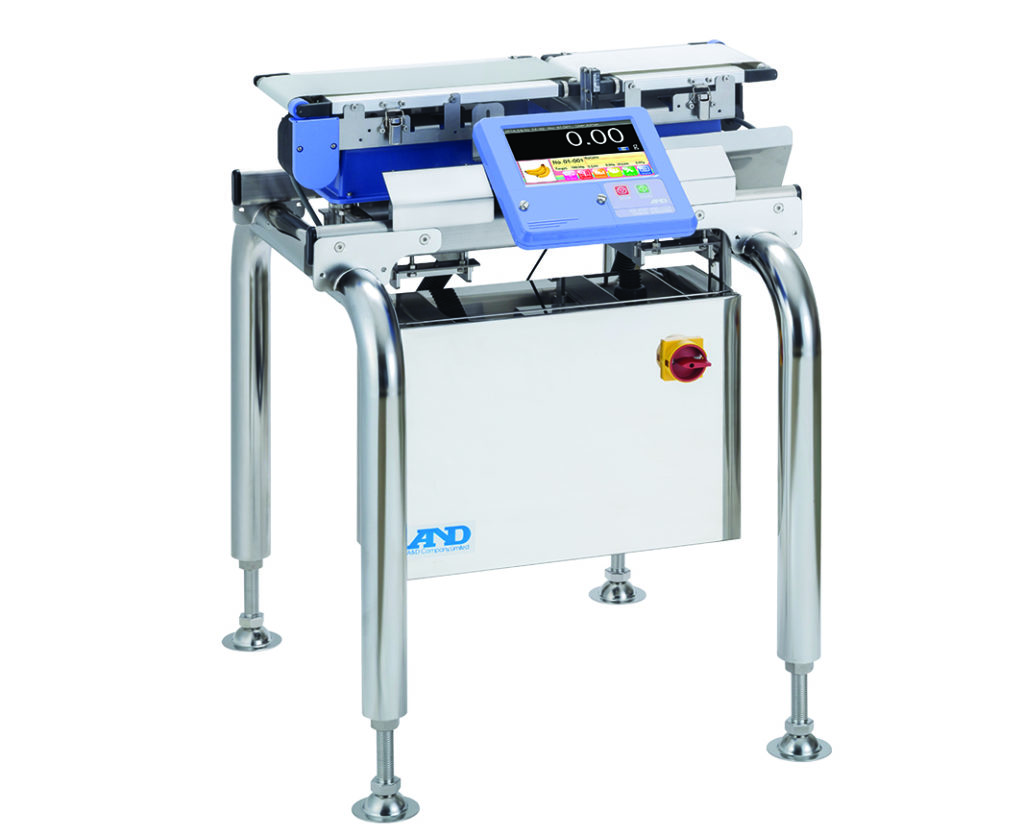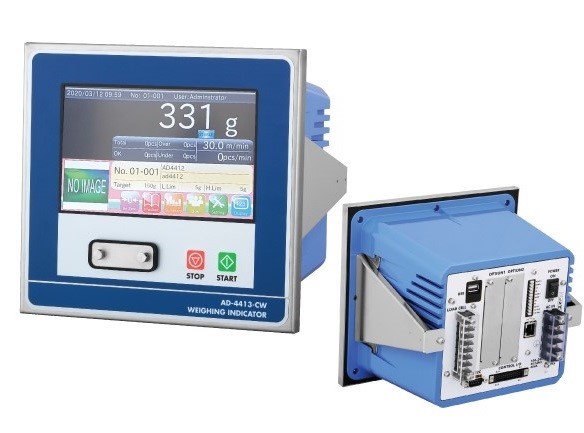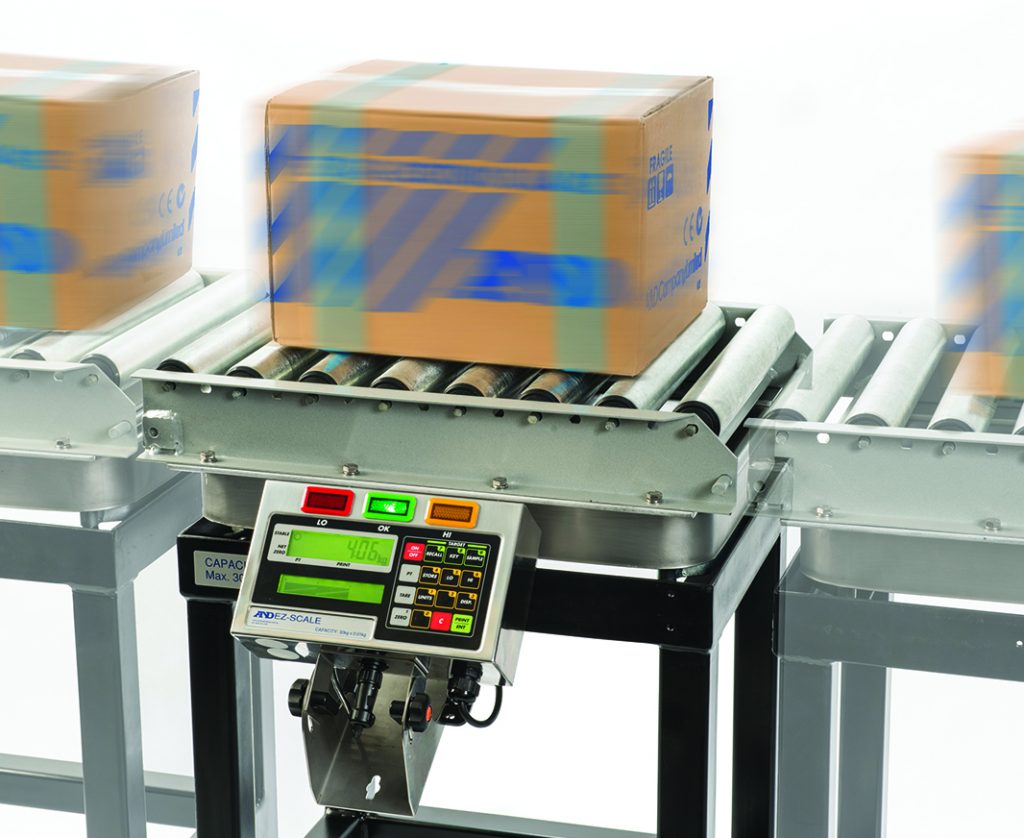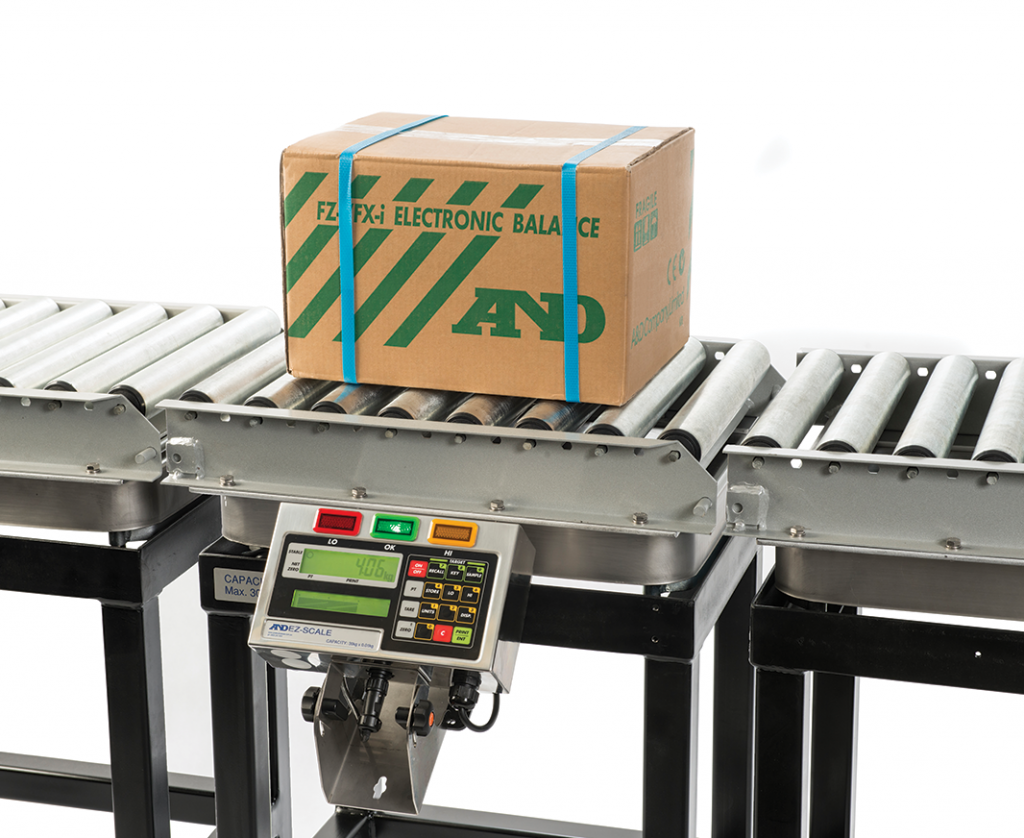How does a checkweigher work?
A checkweigher is a measuring instrument that checks the weight of packaged commodities. Normally found at the end of the production process, in-line checkweighers are used to ensure the weight of products are within the specified limits.
A typical check weigh system is comprised of a series of powered conveyor belts, usually including:
- An infeed section
- A weighing section
- An outfeed section which includes a sorting/rejecting device
- A weighing terminal as user interface
Unlike static scale checkweighers, these in-line systems are referred to as dynamic checkweighers.
While static scales are used to check the weight of products that stand still, dynamic checkweighers weigh products in motion. Static scale weighing is a manual operation requiring product weighing, result recording and then product removal for the next weighing procedure. Meanwhile, dynamic checkweighing is entirely automatic and does not need any manual intervention or a dedicated operator. Products are automatically weighed as they pass along a production line, with under or over-weight products being rejected from the production line by automated removal devices such as pneumatic pusher arms or air-jets. This means, while static scales are generally only used for sample spot-checking, dynamic checkweighers weigh and record 100% of the products produced.
A typical dynamic checkweigher has a system of three conveyor belts arranged in a row. Products are taken from the customer’s conveyor belt by the infeed belt, which separates the product using product acceleration and transfers it to the weighing belt. After being weighed, the product is then transferred to the outfeed, or discharge, conveyer belt. At this stage, products will be separated according to the customer’s requirements – with off-weight products being removed from the production line in order to allow good products to go through to the next processing stage. In most cases, products cannot be less than the printed net weight on the packs, but in some cases, checkweighers judge based on batch average weight where the ‘e’ symbol is used.
Which features of checkweighers are important?
In order to guarantee a safe production chain, dynamic checkweighers must meet a series of industry requirements.
It is important that checkweighers have high measuring precision and throughput. If measurements are inaccurate, this can lead to an unnecessary loss of material due to overfilling. Under-filling during production is equally as detrimental to businesses, causing damage to the brand and leading to expensive recall campaigns. Further to this, the more pieces per minute that a checkweigher can produce, the higher a company’s profit margins.
If your production line is involved with wet products, a waterproof checkweigher is imperative. A checkweigher with IP65 protection is protected from dust and water, and a hygienic design is crucial when using checkweighers in the food and pharmaceutical industries. Hygienic design means that parts, components and production facilities are designed in a way that allows the entire system to be washed. For instance, parts being removable for the purpose of cleaning them.
Modular and configurable designs are key in ensuring that checkweighers can cover a wide range of applications, as well as fast and simple assembly and maintenance.
Dynamic Checkweigher
Checkweighers offer precise weighing, helping to prevent under or overfilled packages from reaching consumers by removing them from the production line before they can cause further issues for the production company. The use of these machines can help to reduce product waste and rework time by providing completeness checks for package components.
Pharmaceutical Checkweigher
Checkweighers offer precision weighing that allows for accurate verification of a product’s completeness. They are so precise that they can detect the slightest variations in weight. For pharmaceutical products, this is crucial as it means that products with missing instructions for use can be removed before distribution. They can also be equipped with open flap detection in order to help remove askew products or products that have not been properly closed. Once the system detects these issues, the checkweigher can remove the problematic products, thus avoiding dangerous consequences for consumers, and a product recall that would be damaging to the brand’s reputation.
Food Industry Checkweigher
Using a checkweigher guarantees consistent weights across your products. This is particularly useful if your product uses pre-printed food packaging and labelling, as it allows companies to ensure their products match their advertised weight and nutritional information. Checkweighers can also act as an inspection system; if items are out of weight specification, this can indicate potential contaminants such as large foreign objects in the product. Thus, checking the weight of products in this way reduces the potential for danger to your customers and costly product recalls. For fine contaminant detection, checkweighers can be combined with x-ray or metal detection systems to offer a complete inspection solution. Staying within the required limits to reduce over-packing/filling, checkweighers help to reduce waste. Thus, by establishing a more streamlined production process, companies can keep running costs down and increase profit margins.
Supermarket Compliant Checkweigher
When choosing supermarket products, consumers expect high-quality, safe food that is free from contaminants. Major supermarket chains, such as Coles, Woolworths and Aldi, have a reputation to upkeep, so manufacturers must meet strict QA standards. Combination checkweighers are crucial in making sure that food remains free from contaminants. An additional x-ray or metal detector module can indicate potential contaminants such as metal in the product and will lead to the product’s removal from the conveyor belt. Checking products this way reduces the potential for danger to your customers and mitigates costly product recalls.
Customised Checkweigher
Not every type of product inspection requires the same technology to ensure safety and quality. Your products and processes will dictate which systems might best suit you. Our expert team at A&D will provide consultation to help you determine how best to take advantage of technologies to increase your efficiency, quality and throughput. We can even tailor a return-on-investment report to your business. Contact our team today for custom solutions for non-standard applications.
Checkweigher for Wet & Harsh Environments
A&D’s checkweighers for wet and harsh environments are rated IP65 – meaning they are built to support a rigorous sanitation routine. To improve efficiency, A&D’s washdown checkweighers are designed for easy cleaning and maintenance, and they meet the requirements of hygienic food processing.
Benefits of Checkweighers
Checkweighers give precise weight measurements that ensure products are consistent with stated guidelines. This can help companies to eliminate returns and complaints, instead securing brand loyalty from their customers. Thus, they are key in reducing the loss of profit and materials.
Checkweighers increase productivity by eliminating the need for manual sample testing and recording for weight. The automation of the production process will ensure that your company is 100% efficient.
Using a checkweigher gives companies peace of mind that their production plants are 100% compliant with consumer-protection legislation and retailer requirements.


